10 Little-Known Ways to See How Much Traffic a Website Gets
When the average person visits a website for the first time, their eyes follow an F-pattern.
When I visit a website for the first time, I look at something else. In less than a second, I have a decent idea of how much traffic that website gets which helps me decide whether or not to stay.
Knowing how much traffic a website gets helps you validate the website’s content and lets you know how much traffic you need to get to see similar results.
Here are ten little-known techniques for figuring out how much traffic someone else’s website gets.
By the way, SEMRush is my favorite tool.
1. Alexa Ranking
The Alexa Ranking isn’t exactly “little-known,” but it is the best-known metric for ranking websites. This is the first thing I look at when I visit a site:
Alexa tracks stats for everyone who has the Alexa toolbar installed on their browser, which accounts for less than 1% of internet users. So it’s not very accurate, but it’ll give you a rough idea of the website’s popularity.
- If you use Chrome, install the Alexa Extension.
- If you use Firefox, get the Alexa Add-On.
![]()
Alexa’s reliability is shaky – some argue that it’s worthless – so it’s important to consider other metrics.
2. SEMRush.com
My favorite tool for website-based keyword research is SEMRush.com. Here’s a screenshot when you search IncomeDiary.com:
 Semrush gives you a lot of information on a websites search engine rankings, how much traffic they get for those rankings, competitors, paid advertising, backlinks and so much more.
Semrush gives you a lot of information on a websites search engine rankings, how much traffic they get for those rankings, competitors, paid advertising, backlinks and so much more.
As you can see from the screenshot above, IncomeDiary ranks 1st for “how to make money from a website,” 4th for “famous entrepreneurs,” and 11th for “business movies.” Those are highly competitive keywords that are collectively searched over 10,000 times per month.
As you go down the list, you can start to estimate how much traffic he gets for each keyword based on the position and search volume.
3. SimilarWeb.com
SimilarWeb is a website traffic checker that’s similar to Alexa, except, it’s got a lot more detail put into it, so it’s more accurate!
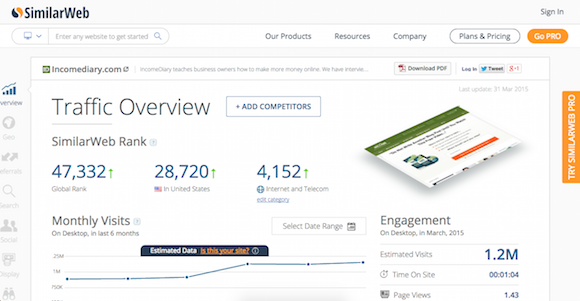 The main takeaway is that it gives you a line graph with values for the number of daily unique visitors and the sources. You can see the countries that your traffic comes from, top referring sites, the top destination sites (sites people visit after yours), display ads, audience interests, and up to 10 organic keywords with the free version.
The main takeaway is that it gives you a line graph with values for the number of daily unique visitors and the sources. You can see the countries that your traffic comes from, top referring sites, the top destination sites (sites people visit after yours), display ads, audience interests, and up to 10 organic keywords with the free version.
4. Ahrefs.com
Without a doubt, Ahrefs is one of the best tracking tools I have ever used! This software provides such a wealth of website traffic information. You can find out:
- New, lost and broken backlinks.
- Domains sending the most traffic to a site.
- Search engine rankings.
- How much traffic a search engine ranking is getting a site.
- Pages from a site getting the most traffic.
- You can compare website rankings vs competitors.
And so, so much more…
 Not only is Ahrefs great for tracking competitor websites, it’s also a huge help when it comes to figuring out how to improve your own sites!
Not only is Ahrefs great for tracking competitor websites, it’s also a huge help when it comes to figuring out how to improve your own sites!
5. AuthorityLabs.com
AuthorityLabs allows you to track your competitors search engine rankings side by side with your own.
 Like SemRush, it tells you how high you are ranking and how many people are looking at that search term. A great tool, that seems to be growing in popularity.
Like SemRush, it tells you how high you are ranking and how many people are looking at that search term. A great tool, that seems to be growing in popularity.
6. YouTube or Vimeo Views
If a website has a YouTube or Vimeo video embedded on the homepage, click to “Watch on YouTube.”

If the video is public, both YouTube and Vimeo will show the view counts. Also check the upload date to estimate how many people view it per month.

Just because the homepage Dollar Shave Club video has almost 4 million views doesn’t mean that their site had 4 million views. But it gives you some idea of how much traffic they got in their first month.
7. Blog Post Comments
Another way to gauge the popularity of a blog is to look at how many comments it gets per post.
With my sites, I’ve found that an average of 1 out of every 200 readers leaves a comment. So a post with 20 non-Nicholas comments was viewed about 4,000 times. This changes with every post and every blog, but again, it gives you a general idea.
8. Total Comment Counts
Immediately after you comment on a WordPress blog, your browser redirects you to where your comment will show up. If you look at the URL, you’ll see something that looks like this:

The second half of the URL tells you that you left the 108,656th comment on IncomeDiary.com. This number includes spam comments. Assume that 75-90% of the comments are spam and you can get an idea of how many comments a site has had since day one.
9. Search for Interviews
A large percentage of successful website owners do interviews, talking about how they built their site and what works for them. Often, they will share not only how much traffic they get, but also where it’s coming from.
You can see some examples of bloggers talking about how much traffic they get by looking through some of the interviews we have conducted for IncomeDiary.
In my experience, a lot of people are more open about sharing traffic stats then you would think. You see this not just in interviews but if you peruse through the archived articles on a blog, there’s a good chance you’ll stumble upon a “blog in review” or “traffic report” post. With those stats, you can start to figure out how much traffic the site is getting today.
10. Check “Advertise Here” Pages
By far, the most accurate way to figure out how much traffic a website gets is to go to their Advertising page.
If a blog is trying to sell advertising space, they need to tell you exactly how many unique views and impressions your ad is going to get every month.
If you sell advertising space on BuySellAds, you need to share your monthly unique and monthly impressions.

The Final Word
Unless the owner of the website reveals exactly how much traffic they’re getting, every other figure is a best guess. Most tools are surprisingly inaccurate when it comes to generating stats. They are good, however, for comparing yourself against others.
Do you know of any other ways to figure out how much traffic a site gets?
"Do Not Write Another Blog Post Until You Watch This Free Video..."

Watch this free video to learn...
- How I got over 10,000,000 people to visit my websites.
- The types of blog post that got me all that traffic.
- How to get someone else to do it for you!


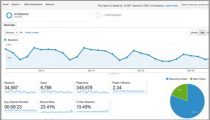

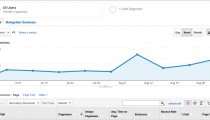

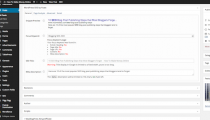


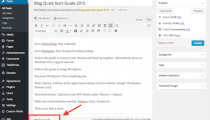

Those are some fantastic tools, Tart. I love how we can use these little tools to check the traffic of a site.
-Dev
Which ones are new to you, Dev?
Thanks Nicholas. Never heard of some of these. I have been using SEMRush quite a lot; it’s really good.
Yeah, I believe James Schramko told me about that site. I’ve spent hours and hours on it since. Fascinating stuff.
As always a great post Nicholas! I haven’t tried Google Trends yet and I’m going to do that right now! These are really great tools to gauge where your website ranks and need to improve. Thanks for the article!
Yeah, that one is new to me as well. Apparently, it’s a lot more accurate but it doesn’t give you raw data.
“If you use Internet Explorer, switch to Chrome” This is the best phrase of this article Nic.
Additionally, I would add Quantcast analytics. But that depends on the site, and if the owner decides to make it public or private.
I’m glad you appreciated that, Servando. I try to drop little, implementable internet tips in the posts I write to make it easier for people to take my advice. Also, you’ll always remember the person who convinced you to switch to Chrome ;)… I was looking at Quantcast and I wasn’t impressed with their tool. Perhaps it’s worth a second look.
Thanks for your answer Nicholas. I’ve switched to chrome for many years now, since version 1 (or even BETA). I even have it on my Smartphone. About Quantcast, the tool might give you interesting information if the owner of the website makes everything public. Otherwise, it shows close to no data at all.
Another tool I can recommend you, specially if you use to travel or go out a lot, is woopra.
Great research Nick and i love it so much.
As for me, the first thing i check on any site is the alexa ranking and the SEM ruch info.
Sheyi
Hmm… Interesting that you check the SEMRush. Are there any extensions or add-ons that you use to make it easier?
Great post Nick. One thing I did spot was Complete.com say I get 30k visitors a month, which we both know is wrong. Which of these tools would you say is most accurate?
Michael
Thanks, Michael. I remember you talking about the Alexa Ranking and how inaccurate it is as well. I think Feed Compare is fairly accurate for subscriber counts and SEMRush is spot on for looking up rankings.
Ok so to put things in perspective… all of these are INACCURATE!!
– Compete only shows “visitors in US” … even those are wrong.
– Alexa is totally wrong.
– FeedCompare doesn’t work with all sites (users must have the awareness API enabled)
– BuySellAds only show impressions of the pages that the ad script is on. So if you are only selling the ads on the blog single post pages, then you don’t really see the exact traffic..
– Google Trends – extremely unreliable…
– Comment Counts can be inflated…
– SEM Traffic doesn’t tell you how much traffic you get…
Solution, get access to their Google Analytics. That is the only way to tell accurate results.
Thanks for clearing these up, Syed. I didn’t realize that BuySellAds only shows traffic from pages you advertise on. My goal with the post was to show people how to get a general idea of how much traffic a site gets. Perhaps I should’ve drove home that point a little harder. For the sites that allow the awareness API, is FeedCompare at all accurate?
For me I try not to focus much on the rankings for sites I read daily. If I do that I might be missing out on valuable content that will help me. If I started focusing on the traffic rankings some sites I wouldn’t read but the information is dynamite and it’s my lost. But this helps me improve my site. Does the rankings specify how long the blog has been active? I enjoyed this posts Nick!
That’s a good point, Abigail. I think for blogging-related blogs, it’s important to consider the rankings when deciding whether or not to follow the advice. But for other niche sites, I can see how we can miss out on a bunch…. You can figure out how long the domain has been active by looking it up on WHOis.net. Or simply navigate to the first post and look at the date. If date isn’t listed, find the date on the first comment.
Thanks Nick, some of these sites I’ve never even heard of. I’m working with a client who is starting a Moms Blog, and this is really helpful especially adding the advertising page to her site.
Hi Nicholas
I use buysellads to check a website traffic too. Good thing about this is that you get to see how many Twitter followers and Facebook likes on the same page.
I did not know that there were so many ways to check. I just use Alexa ranking and I know of Semrush. I guess Blog commenting is another way. Thanks for these tips
Sure thing, Owen. Again, these tools just give you a general idea. As Syed mentioned above, there’s no way of knowing without the raw data.
Thanks for the list, Nicholas! I have another method that I stumbled on a while back…
For sites that are part of ad networks, like Federated Media or BuySellAds, their traffic is listed and usually kept pretty well up to date as part of their “Publishers” lists.
Obviously, it doesn’t work for all sites, but it does for a lot of them!
Thanks for the post, Nick! I knew about some of these, but SEMRush is completely new to me. I’ve mostly relied on Alexa and Compete. Thanks again, Melissa
You’re welcome, Melissa. SEMRush is fairly new to me too.
Hi Nick,
As always I thoroughly enjoyed your post ……but one thought kept on buzzing in my head while I was reading it!
What hope is there for the new / not so well established blog!!!!!!!!!
All 20 of these ways of establishing how much traffic a site is getting are geared up to sites that have already made it!
Imagine if anyone had tried applying any of the 20 to this site in the very early days, Michael may well NOT have made $5000 or anywhere near that amount!
Nick
You’re right that these tools are only relevant for determining the size of larger sites, but those are the sites that you want to model. So, are you saying that if people saw that IncomeDiary was a small site in his first month (by using these tools), that they wouldn’t have stuck around and ultimately lead to him making money?
Unfortunately Nick that may well have been the case, purely based on people using these tools.
Personally I prefer the good old fashioned gut reaction which boils down to the question”do I like the content?”
Even when there isn`t much to look at or read you just know that you want to stick around or not!
I was unaware that Alexa is used by so few people, I use it because I make a lot of my money with sponsored posts and clients rely on PR and Alexa rank alot to decide who to go with.
Hey Nick,
Thanks for sharing. I guess I’m with some of the other guys here too with SEMRush. I have never used it before, but I will be from now on.
Thanks.
Dan
I just tried SEMRush.com, the site traffic stats were way off, worse than Alexa, Quantcast and Compete. In fact, none of these services show even half of the traffic we actually get. However, all things being equal, we trust Compete more than the others. We still don’t trust the numbers explicitly, but we trust them relatively.
Thanks for the information!!! This article helped me a lot.
Nice post, been wondering some new ways besides Google analytics and SEMrush to both monitor my traffic and traffic on sites I have been trying to match if not surpass regarding unique impressions. First post but great article as always.
Am very impressed by this Post.. Really really thanks for sharing this.